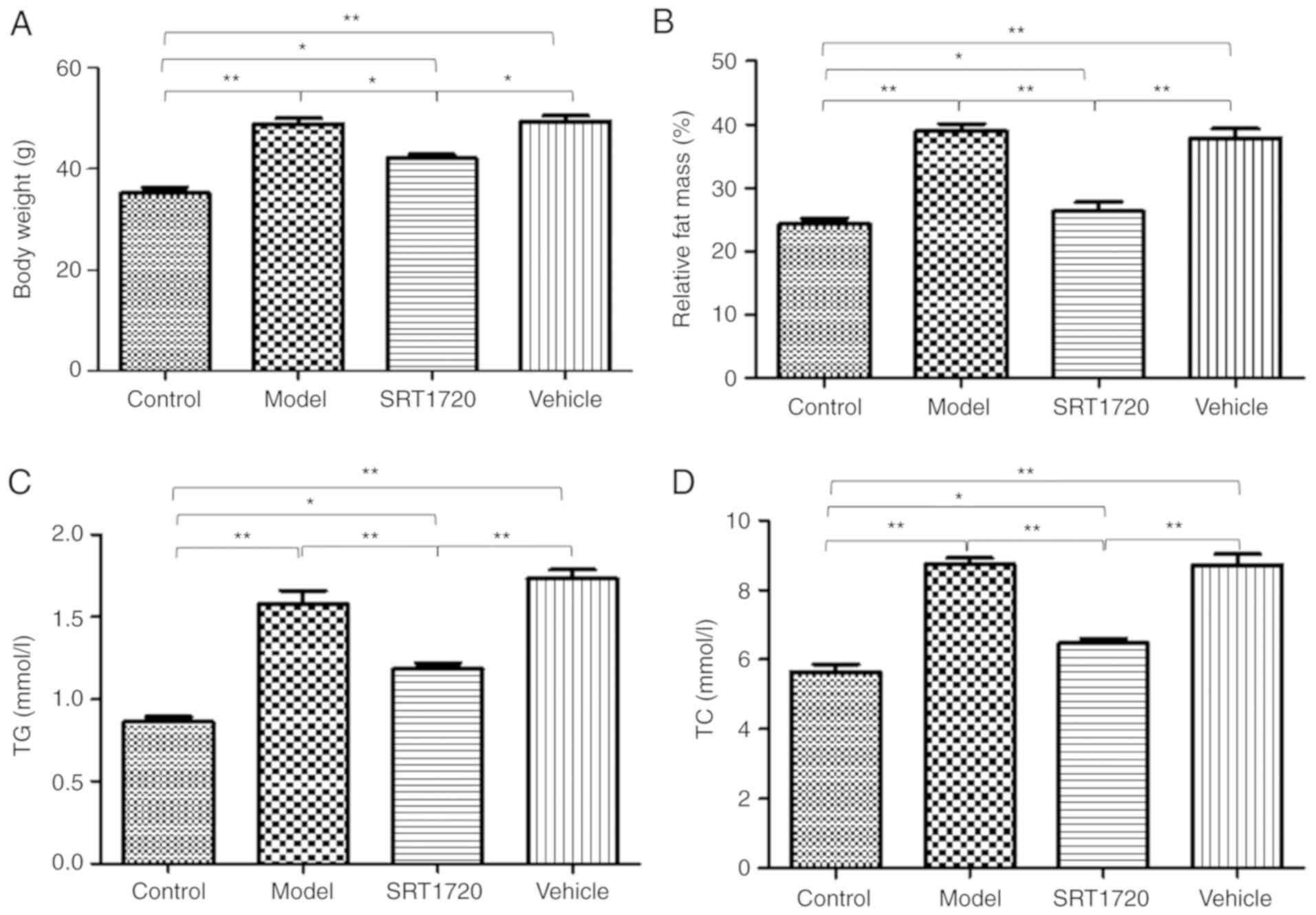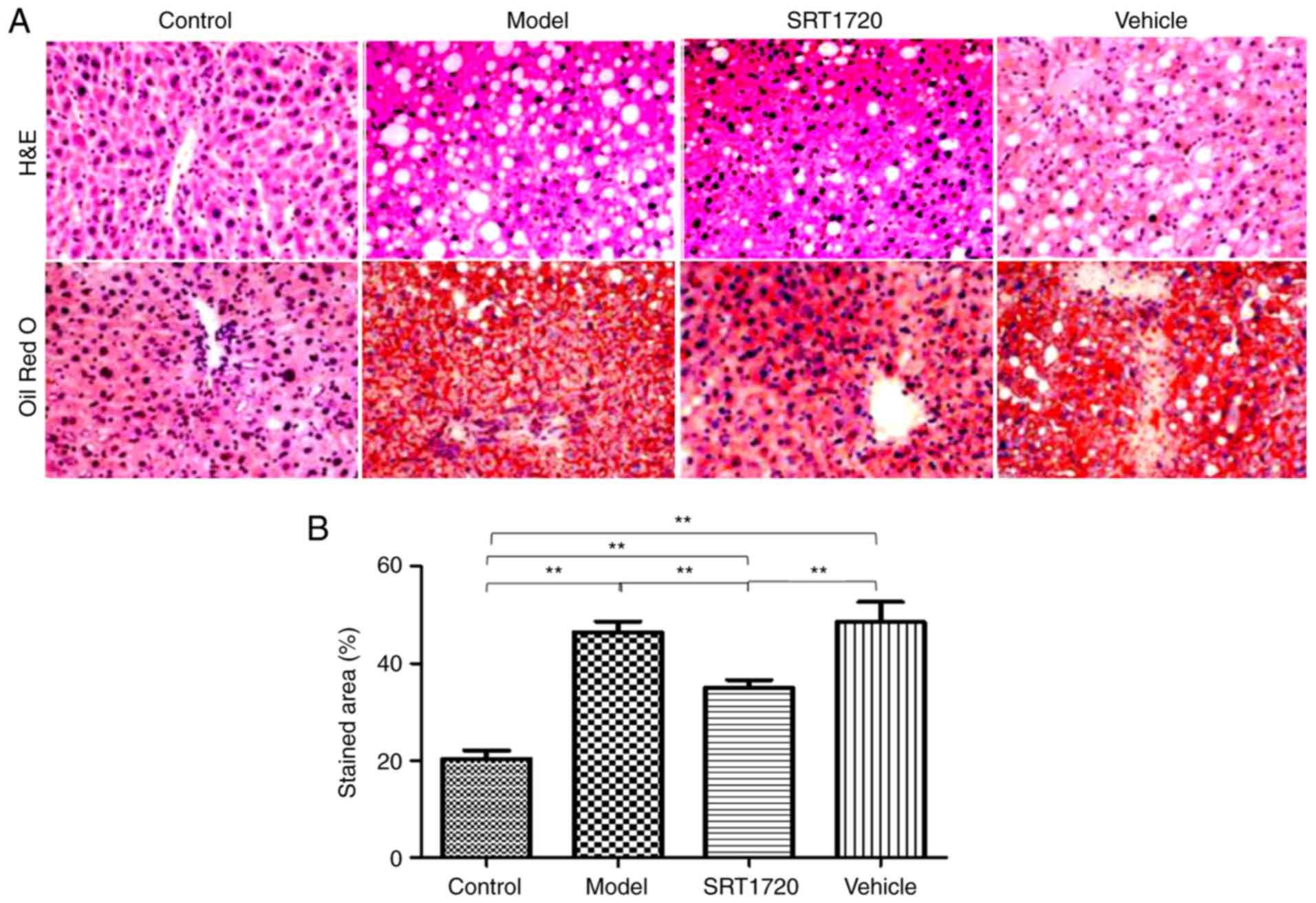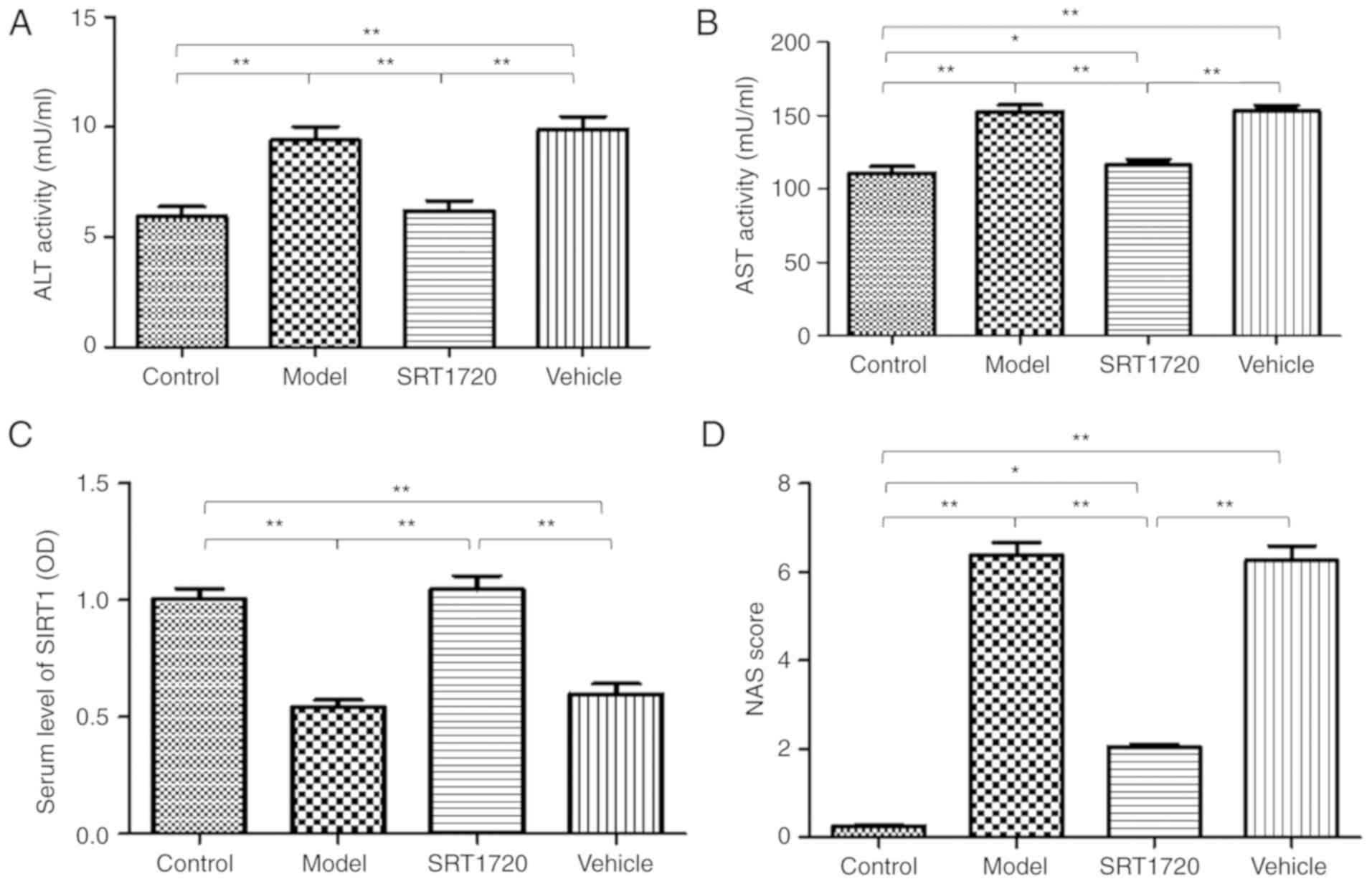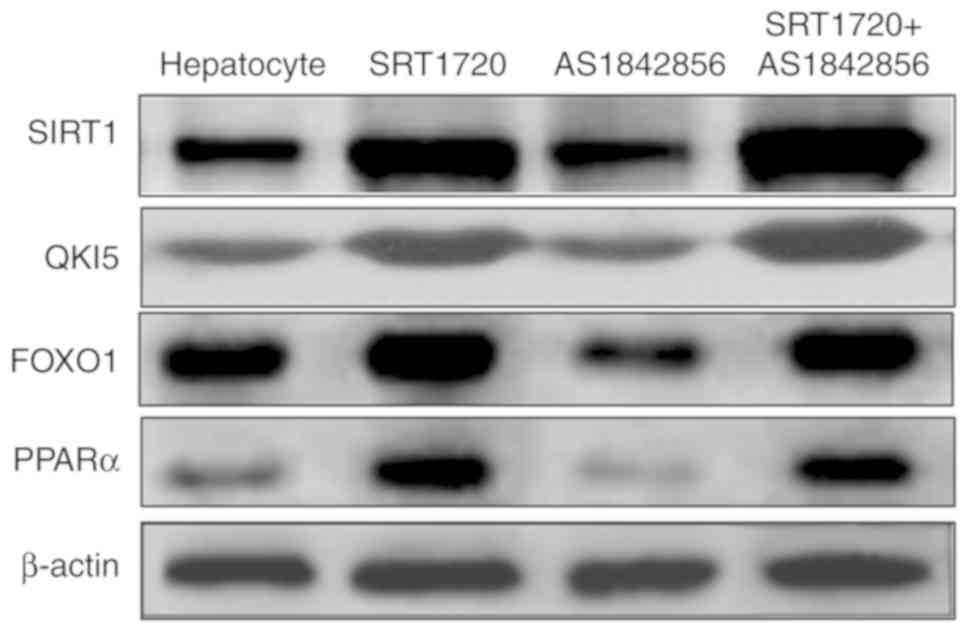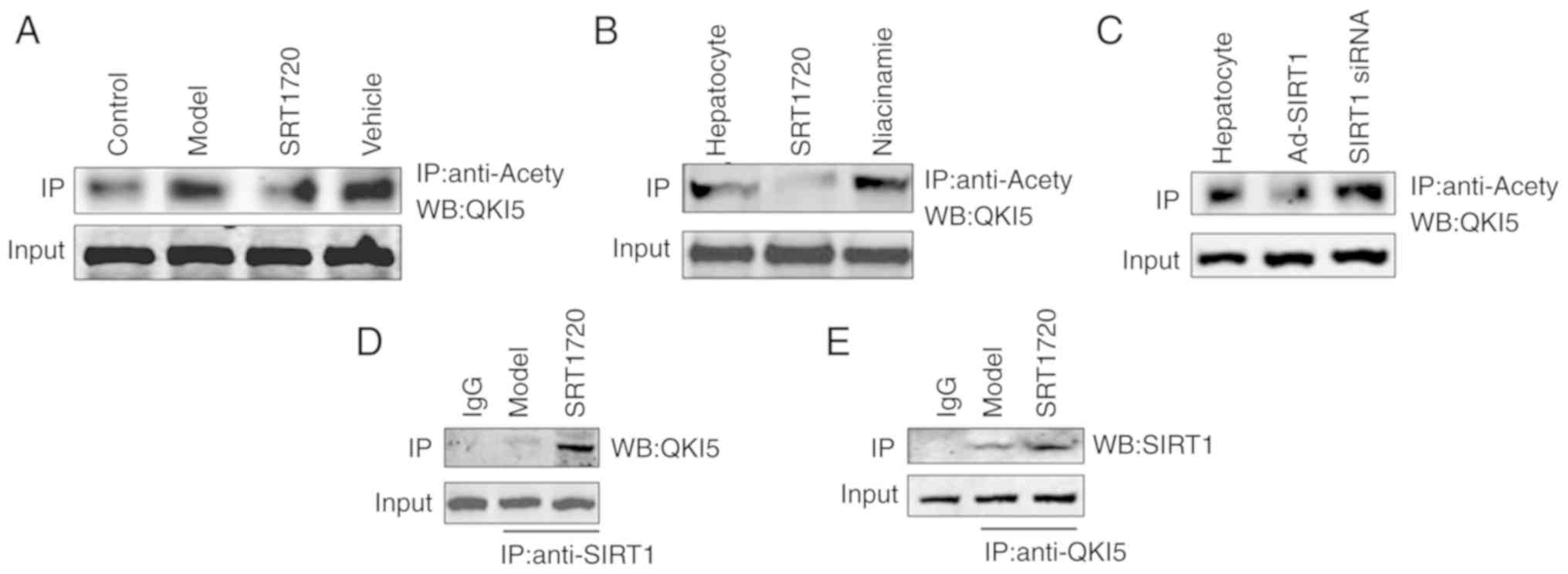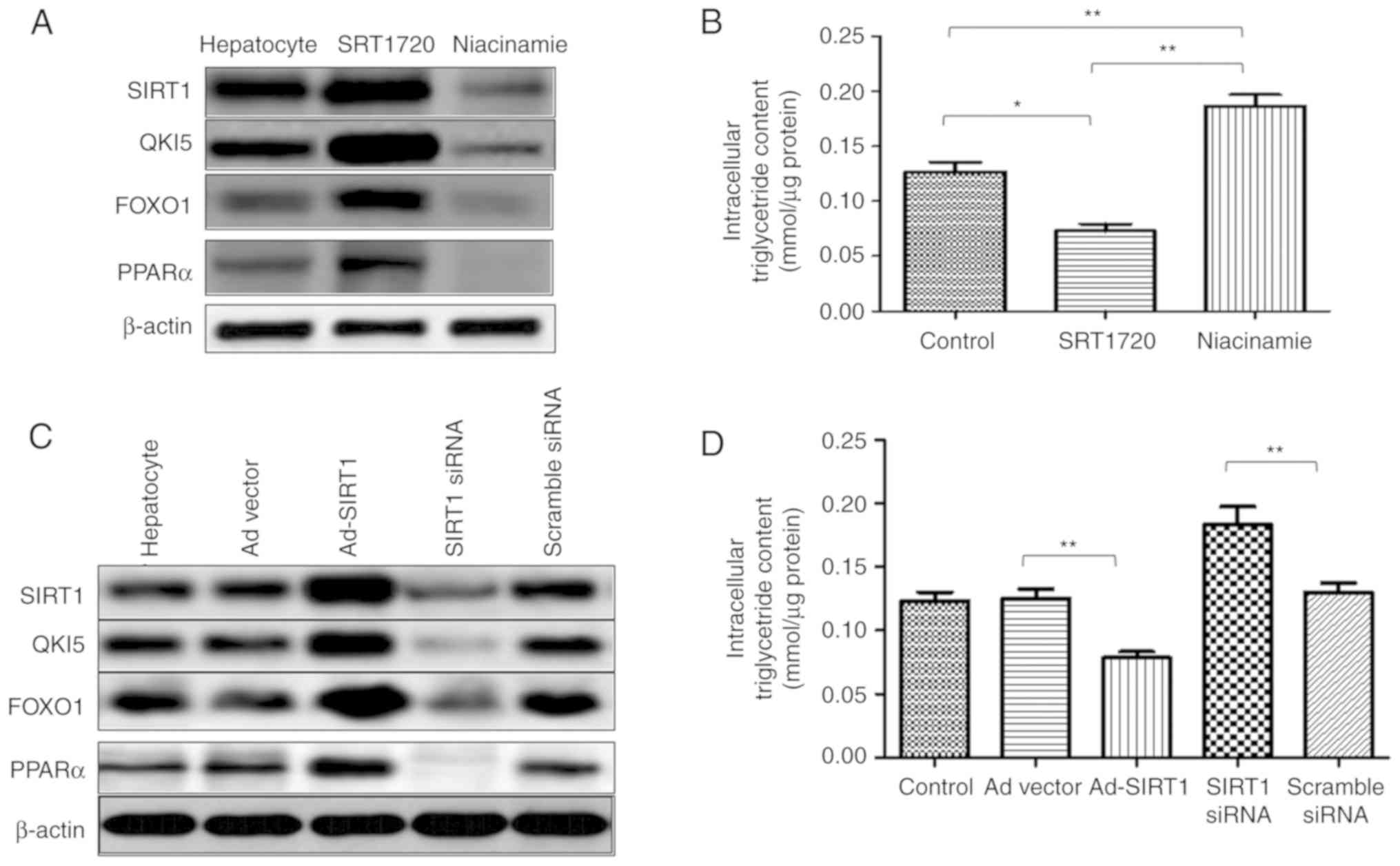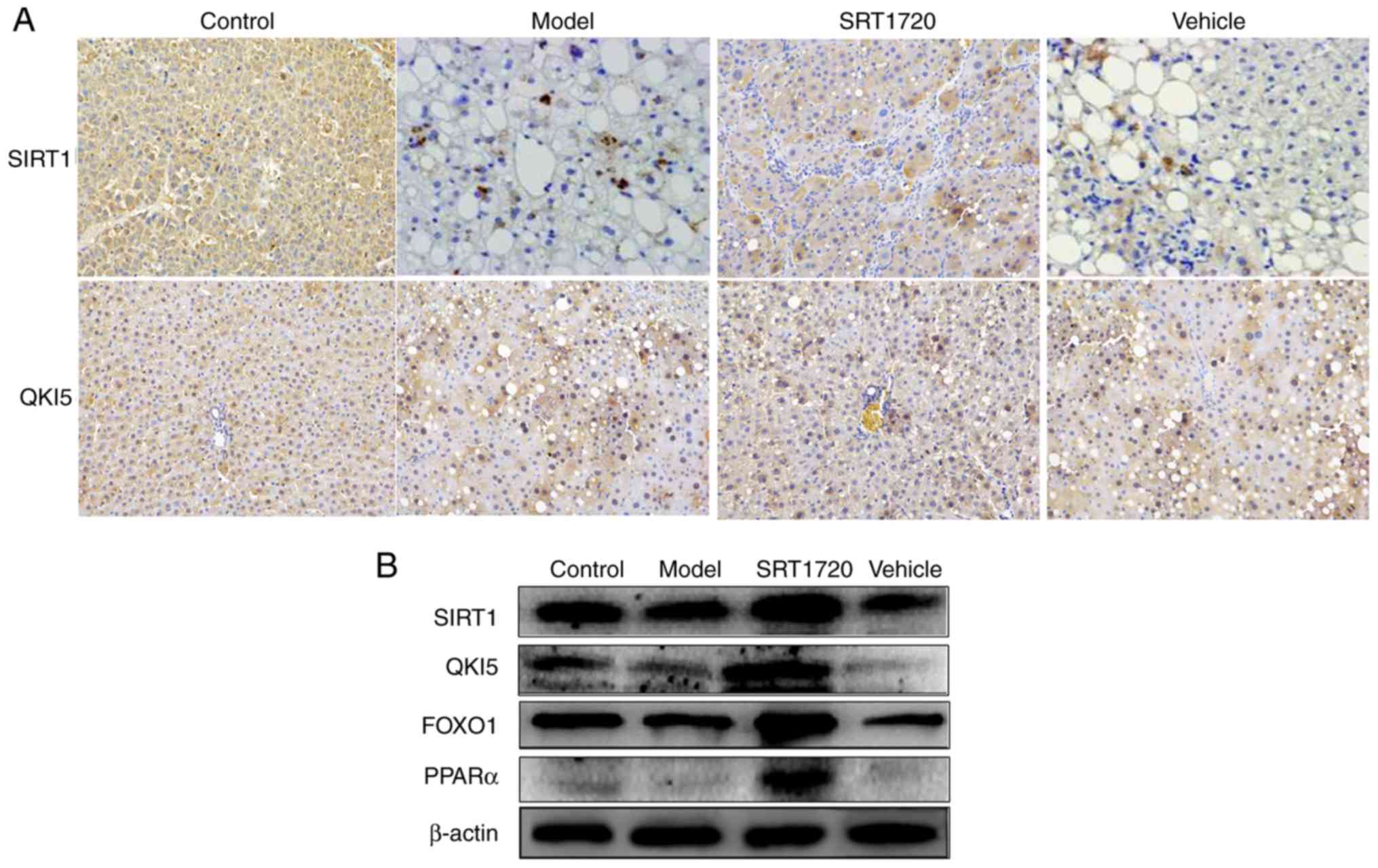|
1
|
Chang Y, Cho YK, Kim Y, Sung E, Ahn J,
Jung HS, Yun KE, Shin H and Ryu S: Non-heavy drinking and worsening
of non-invasive fibrosis markers in nonalcoholic fatty liver
disease: A cohort study. Hepatology. Jul 17–2018.Epub ahead of
print.
|
|
2
|
Wang J, Yang W, Chen Z, Chen J, Meng Y,
Feng B, Sun L, Dou L, Li J, Cui Q and Yang J: Long noncoding RNA
lncSHGL recruits hnRNPA1 to suppress hepatic gluconeogenesis and
lipogenesis. Diabetes. 67:581–593. 2018. View Article : Google Scholar : PubMed/NCBI
|
|
3
|
Jeong HS, Kim KH, Lee IS, Park JY, Kim Y,
Kim KS and Jang HJ: Ginkgolide A ameliorates non-alcoholic fatty
liver diseases on high fat diet mice. Biomed Pharmacother.
88:625–634. 2017. View Article : Google Scholar : PubMed/NCBI
|
|
4
|
Tarantino G, Saldalamacchia G, Conca P and
Arena A: Non-alcoholic fatty liver disease: Further expression of
the metabolic syndrome. J Gastroenterol Hepatol. 22:293–303. 2007.
View Article : Google Scholar : PubMed/NCBI
|
|
5
|
Affo S, Yu LX and Schwabe RF: The role of
cancer-associated fibroblasts and fibrosis in liver cancer. Annu
Rev Pathol. 12:153–186. 2017. View Article : Google Scholar :
|
|
6
|
Estes C, Anstee QM, Arias-Loste MT, Bantel
H, Bellentani S, Caballeria J, Colombo M, Craxi A, Crespo J, Day
CP, et al: Modeling NAFLD disease burden in China, France, Germany,
Italy, Japan, Spain, United Kingdom, and United States for the
period 2016-2030. J Hepatol. 69:896–904. 2018. View Article : Google Scholar : PubMed/NCBI
|
|
7
|
Buzzetti E, Pinzani M and Tsochatzis EA:
The multiple-hit pathogenesis of non-alcoholic fatty liver disease
(NAFLD). Metabolism. 65:1038–1048. 2016. View Article : Google Scholar : PubMed/NCBI
|
|
8
|
Nassir F and Ibdah JA: Sirtuins and
nonalcoholic fatty liver disease. World J Gastroenterol.
22:10084–10092. 2016. View Article : Google Scholar : PubMed/NCBI
|
|
9
|
Pillman KA, Phillips CA, Roslan S, Toubia
J, Dredge BK, Bert AG, Lumb R, Neumann DP, Li X, Conn SJ, et al:
miR-200/375 control epithelial plasticity-associated alternative
splicing by repressing the RNA-binding protein Quaking. EMBO J.
37:pii. e990162018. View Article : Google Scholar : PubMed/NCBI
|
|
10
|
Larocque D, Galarneau A, Liu HN, Scott M,
Almazan G and Richard S: Protection of p27(Kip1) mRNA by quaking
RNA binding proteins promotes oligodendrocyte differentiation. Nat
Neurosci. 8:27–33. 2005. View
Article : Google Scholar
|
|
11
|
Zhao L, Ku L, Chen Y, Xia M, LoPresti P
and Feng Y: QKI binds MAP1B mRNA and enhances MAP1B expression
during oligodendrocyte development. Mol Biol Cell. 17:4179–4186.
2006. View Article : Google Scholar : PubMed/NCBI
|
|
12
|
Saccomanno L, Loushin C, Jan E, Punkay E,
Artzt K and Goodwin EB: The STAR protein QKI-6 is a translational
repressor. Proc Natl Acad Sci USA. 96:12605–12610. 1999. View Article : Google Scholar : PubMed/NCBI
|
|
13
|
de Bruin RG, Shiue L, Prins J, de Boer HC,
Singh A, Fagg WS, van Gils JM, Duijs JM, Katzman S, Kraaijeveld AO,
et al: Quaking promotes monocyte differentiation into
pro-atherogenic macrophages by controlling pre-mRNA splicing and
gene expression. Nat Commun. 7:108462016. View Article : Google Scholar : PubMed/NCBI
|
|
14
|
Wang Y, Vogel G, Yu Z and Richard S: The
QKI-5 and QKI-6 RNA binding proteins regulate the expression of
microRNA 7 in glial cells. Mol Cell Biol. 33:1233–1243. 2013.
View Article : Google Scholar : PubMed/NCBI
|
|
15
|
Wang F, Song W, Zhao H, Ma Y, Li Y, Zhai
D, Pi J, Si Y, Xu J, Dong L, et al: The RNA-binding protein QKI5
regulates primary miR-124-1 processing via a distal RNA motif
during erythropoiesis. Cell Res. 27:416–439. 2017. View Article : Google Scholar : PubMed/NCBI
|
|
16
|
Hall MP, Nagel RJ, Fagg WS, Shiue L, Cline
MS, Perriman RJ, Donohue JP and Ares M Jr: Quaking and PTB control
overlapping splicing regulatory networks during muscle cell
differentiation. RNA. 19:627–638. 2013. View Article : Google Scholar : PubMed/NCBI
|
|
17
|
van der Veer EP, de Bruin RG, Kraaijeveld
AO, de Vries MR, Bot I, Pera T, Segers FM, Trompet S, van Gils JM,
Roeten MK, et al: Quaking, an RNA-binding protein, is a critical
regulator of vascular smooth muscle cell phenotype. Circ Res.
113:1065–1075. 2013. View Article : Google Scholar : PubMed/NCBI
|
|
18
|
Zong FY, Fu X, Wei WJ, Luo YG, Heiner M,
Cao LJ, Fang Z, Fang R, Lu D, Ji H and Hui J: The RNA-binding
protein QKI suppresses cancer-associated aberrant splicing. PLoS
Genet. 10:e10042892014. View Article : Google Scholar : PubMed/NCBI
|
|
19
|
Fagg WS, Liu N, Fair JH, Shiue L, Katzman
S, Donohue JP and Ares M Jr: Autogenous cross-regulation of Quaking
mRNA processing and translation balances Quaking functions in
splicing and translation. Genes Dev. 31:1894–1909. 2017. View Article : Google Scholar : PubMed/NCBI
|
|
20
|
Hayakawa-Yano Y, Suyama S, Nogami M,
Yugami M, Koya I, Furukawa T, Zhou L, Abe M, Sakimura K,
Takebayashi H, et al: An RNA-binding protein, Qki5, regulates
embryonic neural stem cells through pre-mRNA processing in cell
adhesion signaling. Genes Dev. 31:1910–1925. 2017. View Article : Google Scholar : PubMed/NCBI
|
|
21
|
Sonnemann J, Kahl M, Siranjeevi PM,
Blumrich A, Blümel L, Becker S, Wittig S, Winkler R, Krämer OH and
Beck JF: Reverse chemomodulatory effects of the SIRT1 activators
resveratrol and SRT1720 in Ewing's sarcoma cells: Resveratrol
suppresses and SRT1720 enhances etoposide- and vincristine-induced
anticancer activity. J Cancer Res Clin Oncol. 142:17–26. 2016.
View Article : Google Scholar
|
|
22
|
Bechmann LP, Kocabayoglu P, Sowa JP, Sydor
S, Best J, Schlattjan M, Beilfuss A, Schmitt J, Hannivoort RA,
Kilicarslan A, et al: Free fatty acids repress small heterodimer
partner (SHP) activation and adiponectin counteracts bile
acid-induced liver injury in superobese patients with nonalcoholic
steatohepatitis. Hepatology. 57:1394–1406. 2013. View Article : Google Scholar : PubMed/NCBI
|
|
23
|
Biel TG, Lee S, Flores-Toro JA, Dean JW,
Go KL, Lee MH, Law BK, Law ME, Dunn WA Jr, Zendejas I, et al:
Sirtuin 1 suppresses mitochondrial dysfunction of ischemic mouse
livers in a mitofusin 2-dependent manner. Cell Death Differ.
23:279–290. 2016. View Article : Google Scholar :
|
|
24
|
Kawano Y and Cohen DE: Mechanisms of
hepatic triglyceride accumulation in non-alcoholic fatty liver
disease. J Gastroenterol. 48:434–441. 2013. View Article : Google Scholar : PubMed/NCBI
|
|
25
|
Donnelly KL, Smith CI, Schwarzenberg SJ,
Jessurun J, Boldt MD and Parks EJ: Sources of fatty acids stored in
liver and secreted via lipoproteins in patients with nonalcoholic
fatty liver disease. J Clin Invest. 115:1343–1351. 2005. View Article : Google Scholar : PubMed/NCBI
|
|
26
|
Wu T, Liu YH, Fu YC, Liu XM and Zhou XH:
Direct evidence of sirtuin downregulation in the liver of
non-alcoholic fatty liver disease patients. Ann Clin Lab Sci.
44:410–418. 2014.PubMed/NCBI
|
|
27
|
Bruce KD, Szczepankiewicz D, Sihota KK,
Ravindraanandan M, Thomas H, Lillycrop KA, Burdge GC, Hanson MA,
Byrne CD and Cagampang FR: Altered cellular redox status, sirtuin
abundance and clock gene expression in a mouse model of
developmentally primed NASH. Biochim Biophys Acta. 1861:584–593.
2016. View Article : Google Scholar : PubMed/NCBI
|
|
28
|
Geng C, Zhang Y, Gao Y, Tao W, Zhang H,
Liu X, Fang F and Chang Y: Mst1 regulates hepatic lipid metabolism
by inhibiting Sirt1 ubiquitination in mice. Biochem Biophys Res
Commun. 471:444–449. 2016. View Article : Google Scholar : PubMed/NCBI
|
|
29
|
Colak Y, Yesil A, Mutlu HH, Caklili OT,
Ulasoglu C, Senates E, Takir M, Kostek O, Yilmaz Y, Yilmaz Enc F,
et al: A potential treatment of non-alcoholic fatty liver disease
with SIRT1 activators. J Gastrointestin Liver Dis. 23:311–319.
2014.PubMed/NCBI
|
|
30
|
Colak Y, Ozturk O, Senates E, Tuncer I,
Yorulmaz E, Adali G, Doganay L and Enc FY: SIRT1 as a potential
therapeutic target for treatment of nonalcoholic fatty liver
disease. Med Sci Monit. 17:HY5–HY9. 2011. View Article : Google Scholar : PubMed/NCBI
|
|
31
|
Tobita T, Guzman-Lepe J, Takeishi K, Nakao
T, Wang Y, Meng F, Deng CX, Collin de l'Hortet A and Soto-Gutierrez
A: SIRT1 disruption in human fetal hepatocytes leads to increased
accumulation of glucose and lipids. PLoS One. 11:e01493442016.
View Article : Google Scholar : PubMed/NCBI
|
|
32
|
Purushotham A, Schug TT, Xu Q, Surapureddi
S, Guo X and Li X: Hepatocyte-specific deletion of SIRT1 alters
fatty acid metabolism and results in hepatic steatosis and
inflammation. Cell Metab. 9:327–338. 2009. View Article : Google Scholar : PubMed/NCBI
|
|
33
|
Kim KE, Kim H, Heo RW, Shin HJ, Yi CO, Lee
DH, Kim HJ, Kang SS, Cho GJ and Choi WS: Myeloid-specific SIRT1
deletion aggravates hepatic inflammation and steatosis in high-fat
diet-fed mice. Korean J Physiol Pharmacol. 19:451–460. 2015.
View Article : Google Scholar : PubMed/NCBI
|















